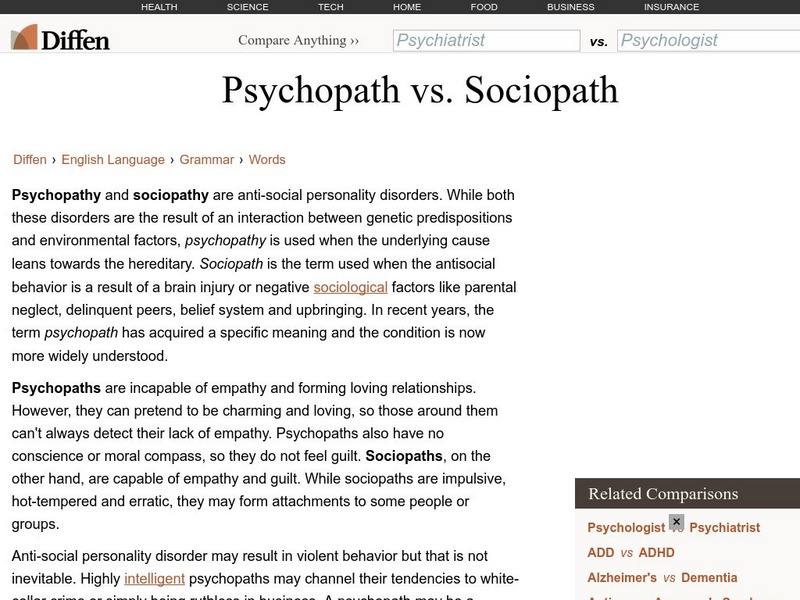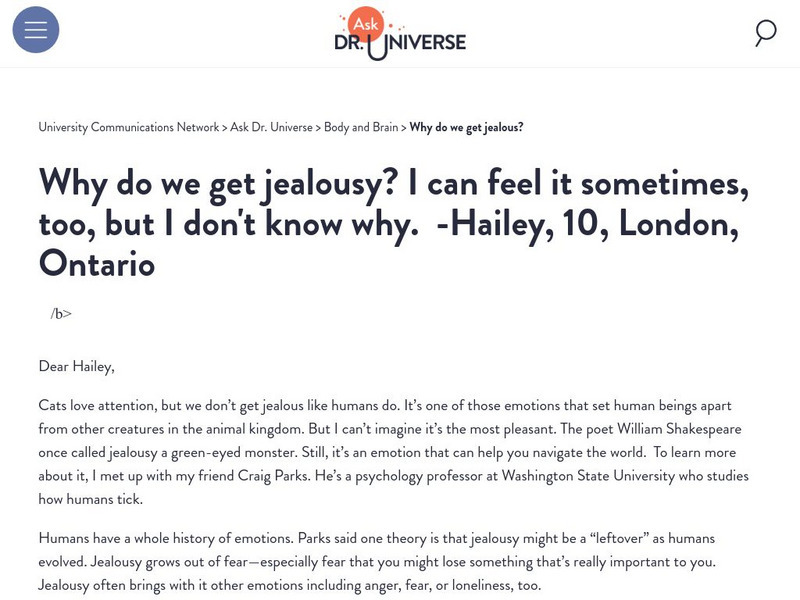Hi, what do you want to do?
TED Talks
Ted: Ted Ed: Should You Trust Your First Impression?
You can't help it; sometimes, you just get a bad feeling about someone that's hard to shake. So, what's happening in your brain when you make that critical first judgment? Peter Mende-Siedlecki shares the social psychology of first...
Sonoma State University
Sonoma State University: Karen Horney Lecture Notes
Lecture notes from a psychology professor. Excellent site for capturing the main topics relevant to Karen Horney and her theories - biography, relationship to Freudian psychology, explanation of all major terms and theories, development...
CommonLit
Common Lit: Can We Cultivate Our Own Happiness
Martin Seligman coined the term "positive psychology" to describe his exploration of how people can improve their own happiness. In this report from 2002, ABC News explains Seligman's research and findings in the field of positive...
Other
English Made in Brazil: Vygotsky
Discusses the social aspects of language acquisition according to Vygotsky.
Diffen
Diffen: Psychopath vs. Sociopath
Start learning about two anti-social personality disorders with the comparison chart for psychopathy and sociopathy. Then extend the learning with an article and video about these mental illnesses.
TED Talks
Ted: Ted Ed: Why Are We So Attached to Our Things?
Our sense of ownership emerges incredibly early. But why do we become so attached to things? Christian Jarrett details the psychology of ownership. [4:34]
Other
Influence by Robert B. Cialdini, ph.d.
Covers the six principles of influence: commitment, consistency, social proof, liking, authority, and scarcity.
Washington State University
Washington State University: Ask Dr. Universe: A Green Eyed Monster
Why do we get jealous? What causes the feelings? A psychology professor at WSU helps explain the feeling of jealousy.
Other
Miami University: Intergroup Bias in American Culture
This article examines intergroup bias in American culture. They discuss the levels of bias and try to explain why it happens. At the bottom of the page there are links to different places where bias takes place (political, academic, and...
Other
Optimistic Bias in Perceiving Physical and Mental Health
This article looks at the tendency to view oneself as invulnerable to experience negative life events. They suggest this goes hand in hand with the tendency to overestimate one's probability of experiencing postive life events. (Miami...
Duke University
Racism and Sexism: A Collective Struggle: A Minority Women's Point of View
This site provides an article that discusses sexism and racism against women.
Other
Massey University: Vygotsky
An introduction to some of the basic concepts of Vygotskyean theory. Sections on higher and lower mental functions, intramental vs. intermental abilities, and the zone of proximal development.
Other
Massey Univ.: Saying, Showing, Gesturing, and Feeling
This paper by John Shotter examines language development through Wittgenstein and Vygotsky. He contrasts the theories of language development from both of these psychologists.
Other
Austin Community College: Gender and Sexuality
This site provides notes from a college Psychology class from Austin Community College. Discusses the causes and effects of gender stereotyping and gender polarization.
American Psychological Association
Apa: Family Dynamics Related to Aggression in Boys
This site from the American Psychological Association provides research that concluded family dynamics can affect aggression in boys.
Other
Principia Cybernetica: Homeostasis, Resistance to Change
Explains what happens during homeostasis, or the tendency to achieve balance. Explains the theory of homeostasis as applied to ecological, biological, and social systems.
Other
Job Stress Network
The Center for Social Epidemiology offers study results, upcoming conference information, and other resources related to stress and methods of coping with it, especially in the work place.
Other
Vygotsky's Zone of Proximal Development
Summarizes the Sociocultural theories of Lev Vygotsky and discusses their impact on educational psychology.
Khan Academy
Khan Academy: Group Dynamics in a Graduate School Classroom
Answer this five-question quiz pertaining to the passage "Group Dynamics in a Graduate School Classroom."
Khan Academy
Khan Academy: Dietary Restriction and Sorority Dynamics
This is a five-question quiz pertaining to the passage "Dietary Restriction and Sorority Dynamics."
US Department of Labor
Bureau of Labor Statistics: Counselors
This resource provides information about counseling careers. Also includes duties, training, salaries, work situations, and job outlook.
University of Missouri
Um: Infant and Toddler Basics: Development During the First Three Years
This article describes typical social and physical development for infants and toddlers.
Other
Cyber Parent: How to Grow Self Esteem in Your Child
Site offers information on several aspects of self-esteem. Talks about discipline, positive language to use, and offering choices to children. Includes response to questions from parents.
Houghton Mifflin Harcourt
Houghton Mifflin Harcourt: Cliffs Notes: Perspectives on Abnormal Behavior
An overview of the different models for interpreting and treating abnormal behaviors.
Other popular searches
- Obedience Social Psychology
- Social Psychology Attitude
- Discuss Social Psychology
- Social Psychology Powerpoint
- Prejudice Social Psychology
- What Is Social Psychology
- Social Psychology Aggression
- Social Psychology Influences
- Altruism Social Psychology
- Social Psychology Love
- Altruism + Social Psychology
- Social Psychology Law























